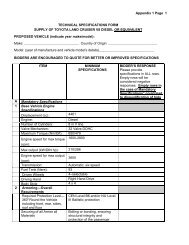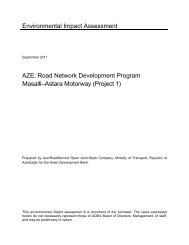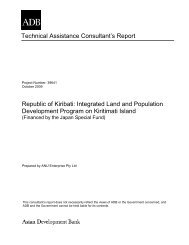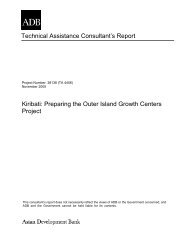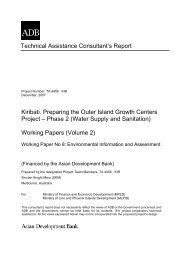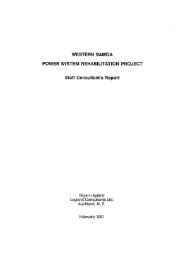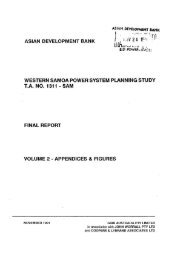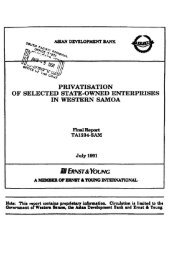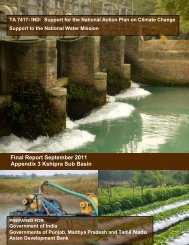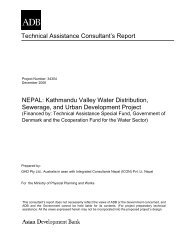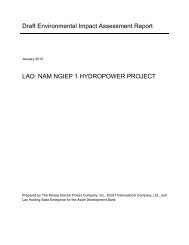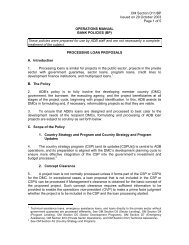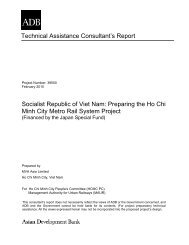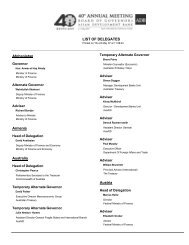- Page 1 and 2:
Technical Assistance Consultant’s
- Page 3 and 4:
CURRENCY EQUIVALENTS (as at 1 June
- Page 5 and 6:
WEIGHTS AND MEASURES 15 mu = 1 hect
- Page 7 and 8:
APPENDIXES (PRESENTED IN SEPARATE V
- Page 9 and 10:
LOAN AND PROJECT SUMMARY Borrower P
- Page 11 and 12:
Implementation Arrangements The Sha
- Page 13 and 14:
Figure 1: Map 1 - The Project Area
- Page 15 and 16:
ix Figure 3: Map 3 - Google Image o
- Page 17 and 18:
Figure 5: Map 5 - Natural Plant Hab
- Page 19 and 20:
Figure 7: Map 7: Shaanxi Louguantai
- Page 21 and 22:
II. RATIONALE: SECTOR PERFORMANCE,
- Page 23 and 24:
maintain ever-increasing staff leve
- Page 25 and 26:
(xiii) lack of national, regional,
- Page 27 and 28:
low salaries, poor benefits and ina
- Page 29 and 30:
and mature product compared to othe
- Page 31 and 32:
into the Province’s tourism indus
- Page 33 and 34:
on Land Degradation in Dryland Ecos
- Page 35 and 36:
CNY 37million to CNY 64million in 2
- Page 37 and 38:
91. Revenue will be generated throu
- Page 39 and 40:
100. Improved Village and Forest-ba
- Page 41 and 42:
plan budget. Provision for this arr
- Page 43 and 44:
Component Sub-component Table 4: Pr
- Page 45 and 46:
Table 5: Project Investment Plan ($
- Page 47 and 48:
Qinling National Botanical Garden (
- Page 49 and 50:
Position Package A: Package A -SARC
- Page 51 and 52:
covered in these reports. Within 6
- Page 53 and 54:
water supplies, (v) a program to im
- Page 55 and 56:
160. Other risks relate to (i) the
- Page 57 and 58:
was between CNY 900 and CNY 1156 pe
- Page 59 and 60:
183. A major lesson from tourism re
- Page 61 and 62:
2 Design Summary Outputs Component
- Page 63 and 64:
4 Design Summary Component III: Ins
- Page 65 and 66:
6 TA 4721-PRC: Preparing the Shaanx
- Page 67 and 68:
TA 4721-PRC: Preparing the Shaanxi-
- Page 69 and 70:
2 TA 4721-PRC: Preparing the Shaanx
- Page 71 and 72:
4 Indigenous People 2 TA 4721-PRC:
- Page 73 and 74:
2 TA 4721-PRC: Preparing the Shaanx
- Page 75 and 76:
4 TA 4721-PRC: Preparing the Shaanx
- Page 77 and 78:
6 TA 4721-PRC: Preparing the Shaanx
- Page 79 and 80:
8 TA 4721-PRC: Preparing the Shaanx
- Page 81 and 82:
TA 4721-PRC: Preparing the Shaanxi-
- Page 83 and 84:
TA 4721-PRC: Preparing the Shaanxi-
- Page 85 and 86:
TA 4721-PRC: Preparing the Shaanxi-
- Page 87 and 88:
TA 4721-PRC: Preparing the Shaanxi-
- Page 89 and 90:
TA 4721-PRC: Preparing the Shaanxi-
- Page 91 and 92:
TA 4721-PRC: Preparing the Shaanxi-
- Page 93 and 94:
TA 4721-PRC: Preparing the Shaanxi-
- Page 95 and 96:
TA 4721-PRC: Preparing the Shaanxi-
- Page 97 and 98:
TA 4721-PRC: Preparing the Shaanxi-
- Page 99 and 100:
TA 4721-PRC: Preparing the Shaanxi-
- Page 101 and 102:
TA 4721-PRC: Preparing the Shaanxi-
- Page 103 and 104:
TA 4721-PRC: Preparing the Shaanxi-
- Page 105 and 106:
TA 4721-PRC: Preparing the Shaanxi-
- Page 107 and 108:
TA 4721-PRC: Preparing the Shaanxi-
- Page 109 and 110:
TA 4721-PRC: Preparing the Shaanxi-
- Page 111 and 112:
TA 4721-PRC: Preparing the Shaanxi-
- Page 113 and 114:
TA 4721-PRC: Preparing the Shaanxi-
- Page 115 and 116:
TA 4721-PRC: Preparing the Shaanxi-
- Page 117 and 118:
TA 4721-PRC: Preparing the Shaanxi-
- Page 119 and 120:
TA 4721-PRC: Preparing the Shaanxi-
- Page 121 and 122:
41 TA 4721-PRC: Preparing the Shaan
- Page 123 and 124:
TA 4721-PRC: Preparing the Shaanxi-
- Page 125 and 126:
TA 4721-PRC: Preparing the Shaanxi-
- Page 127 and 128:
TA 4721-PRC: Preparing the Shaanxi-
- Page 129 and 130:
TA 4721-PRC: Preparing the Shaanxi-
- Page 131 and 132:
TA 4721-PRC: Preparing the Shaanxi-
- Page 133 and 134:
TA 4721-PRC: Preparing the Shaanxi-
- Page 135 and 136:
TA 4721-PRC: Preparing the Shaanxi-
- Page 137 and 138:
TA 4721-PRC: Preparing the Shaanxi-
- Page 139 and 140:
TA 4721-PRC: Preparing the Shaanxi-
- Page 141 and 142:
TA 4721-PRC: Preparing the Shaanxi-
- Page 143 and 144:
TA 4721-PRC: Preparing the Shaanxi-
- Page 145 and 146:
TA 4721-PRC: Preparing the Shaanxi-
- Page 147 and 148:
TA 4721-PRC: Preparing the Shaanxi-
- Page 149 and 150:
TA 4721-PRC: Preparing the Shaanxi-
- Page 151 and 152:
TA 4721-PRC: Preparing the Shaanxi-
- Page 153 and 154:
TA 4721-PRC: Preparing the Shaanxi-
- Page 155 and 156:
TA 4721-PRC: Preparing the Shaanxi-
- Page 157 and 158:
TA 4721-PRC: Preparing the Shaanxi-
- Page 159 and 160:
TA 4721-PRC: Preparing the Shaanxi-
- Page 161 and 162:
TA 4721-PRC: Preparing the Shaanxi-
- Page 163 and 164:
TA 4721-PRC: Preparing the Shaanxi-
- Page 165 and 166:
TA 4721-PRC: Preparing the Shaanxi-
- Page 167 and 168:
TA 4721-PRC: Preparing the Shaanxi-
- Page 169 and 170:
TA 4721-PRC: Preparing the Shaanxi-
- Page 171 and 172:
TA 4721-PRC: Preparing the Shaanxi-
- Page 173 and 174:
TA 4721-PRC: Preparing the Shaanxi-
- Page 175 and 176:
TA 4721-PRC: Preparing the Shaanxi-
- Page 177 and 178:
TA 4721-PRC: Preparing the Shaanxi-
- Page 179 and 180:
TA 4721-PRC: Preparing the Shaanxi-
- Page 181 and 182:
TA 4721-PRC: Preparing the Shaanxi-
- Page 183 and 184:
TA 4721-PRC: Preparing the Shaanxi-
- Page 185 and 186:
TA 4721-PRC: Preparing the Shaanxi-
- Page 187 and 188:
TA 4721-PRC: Preparing the Shaanxi-
- Page 189 and 190:
TA 4721-PRC: Preparing the Shaanxi-
- Page 191 and 192:
TA 4721-PRC: Preparing the Shaanxi-
- Page 193 and 194:
TA 4721-PRC: Preparing the Shaanxi-
- Page 195 and 196:
TA 4721-PRC: Preparing the Shaanxi-
- Page 197 and 198:
TA 4721-PRC: Preparing the Shaanxi-
- Page 199 and 200:
TA 4721-PRC: Preparing the Shaanxi-
- Page 201 and 202:
TA 4721-PRC: Preparing the Shaanxi-
- Page 203 and 204:
TA 4721-PRC: Preparing the Shaanxi-
- Page 205 and 206:
TA 4721-PRC: Preparing the Shaanxi-
- Page 207 and 208:
TA 4721-PRC: Preparing the Shaanxi-
- Page 209 and 210:
TA 4721-PRC: Preparing the Shaanxi-
- Page 211 and 212:
TA 4721-PRC: Preparing the Shaanxi-
- Page 213 and 214:
TA 4721-PRC: Preparing the Shaanxi-
- Page 215 and 216:
TA 4721-PRC: Preparing the Shaanxi-
- Page 217 and 218:
TA 4721-PRC: Preparing the Shaanxi-
- Page 219 and 220:
TA 4721-PRC: Preparing the Shaanxi-
- Page 221 and 222:
TA 4721-PRC: Preparing the Shaanxi-
- Page 223 and 224:
TA 4721-PRC: Preparing the Shaanxi-
- Page 225 and 226:
TA 4721-PRC: Preparing the Shaanxi-
- Page 227 and 228:
TA 4721-PRC: Preparing the Shaanxi-
- Page 229 and 230:
TA 4721-PRC: Preparing the Shaanxi-
- Page 231 and 232:
TA 4721-PRC: Preparing the Shaanxi-
- Page 233 and 234:
TA 4721-PRC: Preparing the Shaanxi-
- Page 235 and 236:
TA 4721-PRC: Preparing the Shaanxi-
- Page 237 and 238:
TA 4721-PRC: Preparing the Shaanxi-
- Page 239 and 240:
TA 4721-PRC: Preparing the Shaanxi-
- Page 241 and 242:
TA 4721-PRC: Preparing the Shaanxi-
- Page 243 and 244:
TA 4721-PRC: Preparing the Shaanxi-
- Page 245 and 246:
TA 4721-PRC: Preparing the Shaanxi-
- Page 247 and 248:
TA 4721-PRC: Preparing the Shaanxi-
- Page 249 and 250:
TA 4721-PRC: Preparing the Shaanxi-
- Page 251 and 252:
TA 4721-PRC: Preparing the Shaanxi-
- Page 253 and 254:
TA 4721-PRC: Preparing the Shaanxi-
- Page 255 and 256:
TA 4721-PRC: Preparing the Shaanxi-
- Page 257 and 258:
TA 4721-PRC: Preparing the Shaanxi-
- Page 259 and 260:
TA 4721-PRC: Preparing the Shaanxi-
- Page 261 and 262:
TA 4721-PRC: Preparing the Shaanxi-
- Page 263 and 264:
TA 4721-PRC: Preparing the Shaanxi-
- Page 265 and 266:
TA 4721-PRC: Preparing the Shaanxi-
- Page 267 and 268:
TA 4721-PRC: Preparing the Shaanxi-
- Page 269 and 270:
TA 4721-PRC: Preparing the Shaanxi-
- Page 271 and 272:
TA 4721-PRC: Preparing the Shaanxi-
- Page 273 and 274:
TA 4721-PRC: Preparing the Shaanxi-
- Page 275 and 276:
TA 4721-PRC: Preparing the Shaanxi-
- Page 277 and 278:
TA 4721-PRC: Preparing the Shaanxi-
- Page 279 and 280:
TA 4721-PRC: Preparing the Shaanxi-
- Page 281 and 282:
TA 4721-PRC: Preparing the Shaanxi-
- Page 283 and 284:
TA 4721-PRC: Preparing the Shaanxi-
- Page 285 and 286:
TA 4721-PRC: Preparing the Shaanxi-
- Page 287 and 288:
TA 4721-PRC: Preparing the Shaanxi-
- Page 289 and 290:
TA 4721-PRC: Preparing the Shaanxi-
- Page 291 and 292:
59 TA 4721-PRC: Preparing the Shaan
- Page 293 and 294:
TA 4721-PRC: Preparing the Shaanxi-
- Page 295 and 296:
TA 4721-PRC: Preparing the Shaanxi-
- Page 297 and 298:
65 TA 4721-PRC: Preparing the Shaan
- Page 299 and 300:
67 TA 4721-PRC: Preparing the Shaan
- Page 301 and 302:
TA 4721-PRC: Preparing the Shaanxi-
- Page 303 and 304:
TA 4721-PRC: Preparing the Shaanxi-
- Page 305 and 306:
TA 4721-PRC: Preparing the Shaanxi-
- Page 307 and 308:
TA 4721-PRC: Preparing the Shaanxi-
- Page 309 and 310:
2 TA 4721-PRC: Preparing the Shaanx
- Page 311 and 312:
4 TA 4721-PRC: Preparing the Shaanx
- Page 313 and 314:
6 TA 4721-PRC: Preparing the Shaanx
- Page 315 and 316:
8 TA 4721-PRC: Preparing the Shaanx
- Page 317 and 318:
2 TA 4721-PRC: Preparing the Shaanx
- Page 319 and 320:
4 TA 4721-PRC: Preparing the Shaanx
- Page 321 and 322:
TA 4721-PRC: Preparing the Shaanxi-
- Page 323 and 324:
1 TA 4721-PRC: Preparing the Shaanx
- Page 325 and 326:
2 TA 4721-PRC: Preparing the Shaanx
- Page 327 and 328:
4 TA 4721-PRC: Preparing the Shaanx
- Page 329 and 330:
6 TA 4721-PRC: Preparing the Shaanx
- Page 331 and 332:
TA 4721-PRC: Preparing the Shaanxi-
- Page 333 and 334:
TA 4721-PRC: Preparing the Shaanxi-
- Page 335 and 336:
TA 4721-PRC: Preparing the Shaanxi-
- Page 337 and 338:
TA 4721-PRC: Preparing the Shaanxi-
- Page 339 and 340:
TA 4721-PRC: Preparing the Shaanxi-
- Page 341 and 342:
TA 4721-PRC: Preparing the Shaanxi-
- Page 343 and 344:
TA 4721-PRC: Preparing the Shaanxi-
- Page 345 and 346:
TA 4721-PRC: Preparing the Shaanxi-
- Page 347 and 348:
TA 4721-PRC: Preparing the Shaanxi-
- Page 349 and 350:
TA 4721-PRC: Preparing the Shaanxi-
- Page 351 and 352:
TA 4721-PRC: Preparing the Shaanxi-
- Page 353 and 354:
TA 4721-PRC: Preparing the Shaanxi-
- Page 355 and 356:
TA 4721-PRC: Preparing the Shaanxi-
- Page 357 and 358:
TA 4721-PRC: Preparing the Shaanxi-
- Page 359 and 360:
TA 4721-PRC: Preparing the Shaanxi-
- Page 361 and 362:
TA 4721-PRC: Preparing the Shaanxi-
- Page 363 and 364:
TA 4721-PRC: Preparing the Shaanxi-
- Page 365:
TA 4721-PRC: Preparing the Shaanxi-
- Page 369 and 370:
13 TA 4721-PRC: Preparing the Shaan
- Page 371 and 372:
15 TA 4721-PRC: Preparing the Shaan
- Page 373 and 374:
17 TA 4721-PRC: Preparing the Shaan
- Page 375 and 376:
2 B. Supervision TA 4721-PRC: Prepa
- Page 377 and 378:
4 TA 4721-PRC: Preparing the Shaanx
- Page 379 and 380:
6 TA 4721-PRC: Preparing the Shaanx
- Page 381 and 382:
8 TA 4721-PRC: Preparing the Shaanx
- Page 383 and 384:
10 TA 4721-PRC: Preparing the Shaan
- Page 385 and 386:
12 TA 4721-PRC: Preparing the Shaan
- Page 387 and 388:
14 TA 4721-PRC: Preparing the Shaan
- Page 389 and 390:
GEFSEC PROJECT ID: EA PROJECT ID: C
- Page 391 and 392:
i) Tourism 5. One of the strongest
- Page 393 and 394:
14. Poor rural households had few o
- Page 395 and 396:
and fauna due in large part to the
- Page 397 and 398:
31. The Qinling Mountain ecosystem
- Page 399 and 400:
continuing communication among stak
- Page 401 and 402:
development under construction, (v)
- Page 403 and 404:
) Objective 50. The impact of the p
- Page 405 and 406:
60. The current animal rescue and e
- Page 407 and 408:
Source (PPTA Estimates) 69. The rev
- Page 409 and 410:
77. Institutional Strengthening The
- Page 411 and 412:
awareness and understanding of mark
- Page 413 and 414:
92. The main risk to the Project’
- Page 415 and 416:
modify the drivers of biodiversity
- Page 417 and 418:
Expected Project National Biodivers
- Page 419 and 420:
Expected Project National Biodivers
- Page 421:
Expected Project National Biodivers
- Page 424 and 425:
Strategic Objectives and Indicative
- Page 426 and 427:
after 5 years. It is suggested that
- Page 428 and 429: the lessons from the Project. All m
- Page 430 and 431: 119. The SPG commitment is demonstr
- Page 432 and 433: 130. In output 1, GEF financing of
- Page 435 and 436: Tracking Tool for GEF Biodiversity
- Page 437 and 438: Tracking Tool for GEF Biodiversity
- Page 439 and 440: Tracking Tool for GEF Biodiversity
- Page 441 and 442: Tracking Tool for GEF Biodiversity
- Page 443 and 444: Tracking Tool for GEF Biodiversity
- Page 445 and 446: Tracking Tool for GEF Biodiversity
- Page 447 and 448: Tracking Tool for GEF Biodiversity
- Page 449 and 450: Tracking Tool for GEF Biodiversity
- Page 451 and 452: Tracking Tool for GEF Biodiversity
- Page 453 and 454: Tracking Tool for GEF Biodiversity
- Page 455 and 456: Tracking Tool for GEF Biodiversity
- Page 457 and 458: Tracking Tool for GEF Biodiversity
- Page 459 and 460: Tracking Tool for GEF Biodiversity
- Page 461 and 462: Tracking Tool for GEF Biodiversity
- Page 463 and 464: Tracking Tool for GEF Biodiversity
- Page 465: Tracking Tool for GEF Biodiversity
- Page 468 and 469: the current tourism portfolio. This
- Page 470 and 471: Please answer YES or NO to each sta
- Page 472 and 473: Ecological Function Conservation Ar
- Page 474 and 475: ADB TA 4271 Shaanxi Qinling Biodive
- Page 476 and 477: 3 ADB TA 4271 Shaanxi Qinling Biodi
- Page 480 and 481: 7 ADB TA 4271 Shaanxi Qinling Biodi
- Page 482 and 483: 9 ADB TA 4271 Shaanxi Qinling Biodi
- Page 484 and 485: 11 ADB TA 4271 Shaanxi Qinling Biod
- Page 486 and 487: 13 ADB TA 4271 Shaanxi Qinling Biod
- Page 488 and 489: 15 ADB TA 4271 Shaanxi Qinling Biod
- Page 490 and 491: 17 ADB TA 4271 Shaanxi Qinling Biod
- Page 492 and 493: ADB TA 4271 Shaanxi Qinling Biodive
- Page 494: ADB TA 4271 Shaanxi Qinling Biodive



